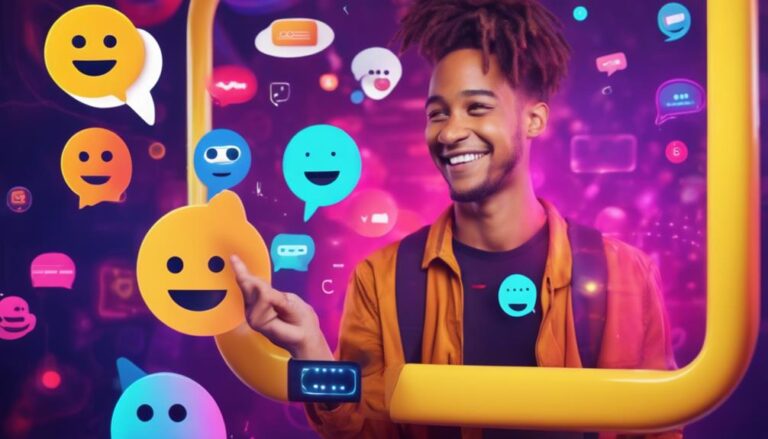I've seen AI chatbots revolutionize customer engagement strategies by utilizing Natural Language Processing and Machine Learning. They offer 24/7 personalized support across various platforms, reducing wait times and boosting customer satisfaction. By automating repetitive tasks, chatbots greatly reduce operational costs and scale effortlessly to meet demand. Industries like healthcare, finance, and e-commerce have already embraced these tools for tasks like appointment scheduling, account inquiries, and sales guidance. Future trends point to even more advanced personalization and integration with IoT devices, promising an unparalleled customer experience. For deeper insights into these transformative impacts, let's explore further.
Key Takeaways
- AI chatbots provide 24/7 customer support, significantly enhancing engagement and satisfaction.
- They automate repetitive tasks, allowing human agents to focus on complex issues.
- Chatbots offer personalized interactions using data-driven insights, improving customer experience.
- They scale effortlessly, handling unlimited customer inquiries simultaneously.
- Integration with IoT devices broadens chatbots' utility, enriching customer service.
Understanding AI Chatbots
AI chatbots, powered by sophisticated Natural Language Processing and Machine Learning algorithms, are transforming how businesses interact with their customers. By leveraging NLP, these chatbots effectively understand and respond to user queries, enabling personalized interactions that enhance customer engagement.
They're integrated into websites, messaging apps, and social media platforms, offering round-the-clock support that automates routine tasks and improves customer service. The data collection capabilities of AI chatbots provide invaluable insights into customer behavior, allowing businesses to refine their strategies.
Through consistent and efficient customer support, AI chatbots are revolutionizing the industry, making interactions more seamless and data-driven. This shift not only boosts customer satisfaction but also streamlines operations, setting a new standard for customer support and engagement.
Key Benefits
By harnessing the power of AI chatbots, businesses can reap numerous benefits that greatly enhance both operational efficiency and customer satisfaction. These digital assistants provide 24/7 availability, ensuring no customer query goes unanswered, and offer quick responses that reduce wait times, thereby enhancing customer satisfaction.
They automate routine tasks, translating into significant cost savings. Additionally, chatbots handle unlimited customer interactions, offering scalability that traditional methods can't match. By collecting valuable customer data, they provide insights into preferences and behaviors, allowing companies to tailor their services more effectively.
This data-driven approach not only boosts operational efficiency but also elevates the overall customer experience. In essence, AI chatbots are a pivotal tool for businesses aiming for innovation and efficiency.
Industry Applications

The transformative potential of chatbots is evident across diverse industries. They streamline processes, enhance customer interactions, and drive operational efficiency.
In healthcare, AI chatbots assist with appointment scheduling and provide medical information, greatly improving patient accessibility.
The finance sector leverages chatbots for account inquiries and transactions, boosting customer service efficiency.
E-commerce benefits from chatbots guiding product selections, leading to higher sales and satisfaction.
In education, chatbots handle student inquiries and administrative tasks, streamlining processes and enhancing the student experience.
These industry applications showcase how AI chatbots revolutionize online interactions and customer engagement. As chatbots continue to evolve, their impact on customer service and operational efficiency will only grow, making them indispensable across sectors.
Implementation Strategies
Recognizing the vast applications of chatbots across industries, we must now explore the implementation strategies that guarantee their effective deployment and maximize their benefits.
Efficient implementation starts with rigorous training using website data or Google, ensuring accurate responses in multiple languages like English, Hindi, and Spanish.
For instance, in the banking sector, chatbots streamline operations and enhance customer service. Cooperative banks have reported a 30% to 40% reduction in audit cycles by automating data collection, greatly improving efficiency.
Similarly, in education, chatbots revolutionize student registration processes, reducing manual efforts by up to 90%.
These strategies not only enhance operational efficiency but also free up human resources to focus on more complex, value-added tasks.
Future Trends

As we look ahead, enhanced personalization powered by advanced algorithms will be at the forefront of AI chatbot innovations. Machine learning will refine AI chatbots' ability to deliver seamless interactions tailored to individual preferences.
We'll see more voice-enabled chatbots, transforming customer engagement with their conversational ease. The integration with IoT devices will further extend their versatility, making them indispensable in smart homes and beyond.
These sophisticated solutions will drive businesses to new heights, offering unparalleled customer experiences. Future trends indicate that as AI chatbots evolve, their role in customer engagement strategies will become even more critical, providing data-driven insights and personalization that were once unimaginable.
This evolution positions them as pivotal tools in the digital landscape.
Frequently Asked Questions
How Does AI Improve Customer Engagement?
AI improves customer engagement by using personalization techniques, predictive analytics, and sentiment analysis. It offers proactive support, leverages customer insights, interaction history, user segmentation, real-time responses, behavioral tracking, and automated workflows for seamless experiences.
How Are AI Chatbots Transforming Customer Service?
AI chatbots revolutionize customer service through natural language processing, leveraging historical data, and sentiment analysis. They offer automation benefits, rapid response speed, and predictive insights while ensuring user privacy, using advanced learning algorithms and training models for continuous improvement.
What Is the Role of Chatbots in Customer Engagement?
Chatbots revolutionize customer engagement by leveraging personalization strategies, enhancing user experience, and improving response times. They analyze conversation analytics and customer insights to predict behavior, elevate interaction quality, and build brand loyalty while maintaining essential human touchpoints.
How Can AI Based Chatbots Improve Customer Satisfaction?
AI-based chatbots improve customer satisfaction by utilizing sentiment analysis, reducing response time, offering personalized responses, ensuring 24/7 availability, and leveraging language processing. They analyze interaction history and predictive analytics for efficient query resolution and service automation.
Conclusion
In embracing AI chatbots, we streamline operations, enhance customer experiences, and future-proof our engagement strategies.
By leveraging data-driven insights, we personalize interactions, increase efficiency, and drive satisfaction.
As industries evolve, we'll continue to innovate, adapt, and excel.
AI chatbots aren't just tools; they're catalysts for transformation.
With a forward-thinking approach, we're not only meeting today's demands but also anticipating tomorrow's needs, ensuring sustained growth and competitive advantage.
The future of customer engagement is here, and it's intelligent.






